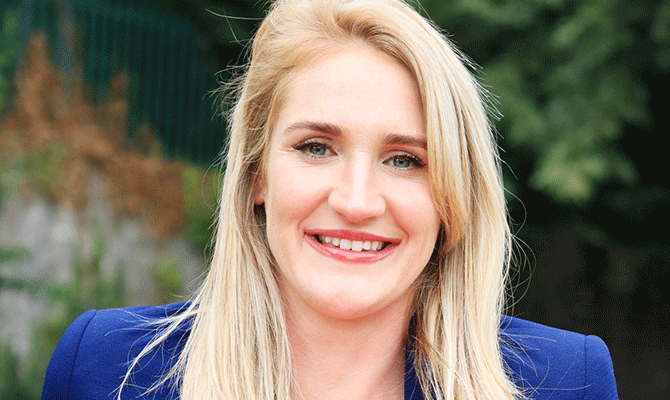
Elisa O'Donovan
THEY SAY that vengeance is a dish best served cold but there’s an added spice to the ambition of Elisa O’Donovan, the Limerick Social Democrat councillor, to take Green TD Brian Leddin’s Dáil seat in the next general election.
In 2021, Leddin was forced to apologise to O’Donovan for misogynistic comments he made about her on a WhatsApp group he had set up some years before. In these comments he described the councillor as “unhinged” and “craving attention”. This followed a series of comments on the group abusing females perceived as political rivals, among which one contributor described O’Donovan as a “c…”.
In his ‘apology’, Leddin regretted the inappropriate language he had used but did not actually regret the criticisms themselves. This was sufficient, however, for the Green’s executive committee to regard the apology as adequate and declare the matter closed, despite strong disagreement from female party members such as TD Neasa Hourigan and even deputy leader Catherine Martin. The latter said she was disappointed that Leddin was not to be sanctioned over the remarks.
O’Donovan also expressed her disappointment at the Green Party’s decision. “To say he did not encourage the group’s comments and only made one remark is quite unbelievable. He laughed with emojis when people called me a ‘c…’. He called me unhinged. As someone who is a victim of these ‘unsavoury and inappropriate’ comments, I am appalled at how he is trivialising such a serious matter,” she said. “No wonder that it’s difficult to get women involved in politics when they have to endure abuse such as this.”
Now, with the Green Party foundering in the polls and Leddin’s Dáil seat in serious danger, Elisa O’Donovan has her chance to have the last laugh.
Born in north London and brought up by Irish parents, Elisa moved to her father’s native Limerick when she was 15. Academically gifted, she earned a place in UCD studying medicine but switched to rehabilitation and disabilities studies. She works as a speech and language therapist in primary care.
Well known in Limerick for her involvement in various health and community campaigns, she was a founding member of the Limerick Feminist Network and, as such, was an ideal choice as a Social Democrat candidate in the local elections of 2019. She won a seat in Limerick City West but incurred the hostility of many political rivals when she spoke up loudly and often.
She temporarily left the Soc Dems during the pandemic, claiming that she felt she could give better representation to her voters as an Independent. There was no local animosity about this, it seems, and the Soc Dems went to some lengths to entice her back, which it did within a year.
As an outspoken activist, it wasn’t only with rivals such as the Greens that she crossed swords. She drew down an avalanche of abuse on herself when she interrupted a public prayer gathering during the pandemic, claiming that the unmasked prayer-sayers were in breach of Covid rules – a far cry, indeed, from the days when Limerick was known as the confraternity city.
But what chance does she really have for the ultimate revenge over Leddin?
The 2019 local elections and 2020 general election only give us a partial guide. Opinion polls since then show a dramatic loss of support nationally for the Greens (to nearly half of its 2020 score), while O’Donovan’s Social Democrats has nearly doubled its support.
In 2020 in the Limerick City constituency the Greens scored 7%, Labour 5.9% and the Soc Dems 3.9% (a combined score of 0.84 of a quota). Indications now are that the Greens could drop to less than 4%, Labour is likely to fall slightly to just over 5%, with the Soc Dems upping its tally to around 6%.
If reality matches this expectation and if the combined vote of the smaller parties remains roughly the same, O’Donovan would be in prime position to garner the transfer of these smaller parties, which would put her in contention for Leddin’s seat.
At one time of course, Limerick City was a certain banker for Labour, stretching back to the infamously social conservative Stevie Coughlan, to the more left-wing Jim Kemmy and then Jan O’Sullivan, who lost her seat in 2020 when her vote more than halved.
It seems Labour’s fortunes have got worse since then and the party remains transfer-toxic, although not as much as the Greens.
Limerick City is dominated by the big three. In 2020, Sinn Féin scored 24% of the vote but national polls indicate this could be as high as 32% next time out. That is 1.6 quotas, putting SF in real contention for a second seat (at Leddin’s expense).
Fianna Fáil, too, under the redoubtable Willie O’Dea, scored well in 2020 but the party has failed to grow its vote, which would rule out a second seat for FF.
With Leddin likely to come in third among the three minnow parties, the key question is whether Elisa O’Donovan can actually draw the requisite transfers from Leddin and Labour. Relations with the Green Party locally are obviously at rock bottom but this does not mean that Green-inclined voters share Leddin’s antipathy.
O’Donovan, meanwhile, has her own environmental credentials. She will be looking to these to ensure that she gets a strong environmentally conscious young vote and is attractive to such voters who remain backing the Greens.
The other side of the equation, however, is how well will SF fare on transfers. Certainly, its current seat held by Maurice Quinlivan is safe but given SF’s strong position in the polls even plumpers – voters who don’t transfer at all – will help SF’s cause.
So, O’Donovan has a mountain to climb if she is to win the seat. She can be reasonably confident of ending up ahead of Leddin – no doubt pleasurable in itself – but she will need a lot of things to go right on the day if she is to take the seat, including getting strong transfers and hoping that SF fall transfer reluctant.
It’s worth noting that in 2020, then Soc Dems candidate Jenny Blake did better on the early transfers than Leddin before she was eliminated herself. Leddin had too big a lead on her for these transfers to alter the balance but Elisa O’Donovan will be expecting to start off from a stronger position. As SF’s Quinlivan was elected on the first count, there is no indication of how the party would have fared on transfers.
Given this background, O’Donovan’s big test will come in next year’s local elections. In 2019, she was the party’s sole successful candidate and she will need to show the party has broader support now if her Dáil hopes are to be realised.
Of course, there is a possibility that the general election could be called on the same day as the locals, something that would throw the whole political strategy system into disarray.


















